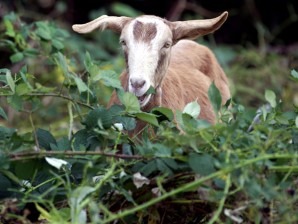Goats put to work clearing land in US city
Portland, Oregon— Deep in the wilds of Portland, invasive species rule. Blackberries, thistle and English ivy occupy deep pockets of brush, choking off native plants and growing into thick tangles impossible to navigate on foot.

GOAT POWER. In this Sept. 8, 2011, photo shows goats feeding on a deep pocket of brush, in Portland, Oregon. Deep in the Portland wilderness, invasive species rule. Blackberries, thistle, English ivy and rhododendron occupy deep pockets of brush, choking off native plants and growing into tangles too thick to navigate on foot. Enter the goat, scourge of the brambles and another part of this city’s odd relationship with agriculture. AP Photo/Rick Bowmer
Enter the goat, scourge of the bramble, and a new denizen in this city’s long love affair with agriculture and all things green. City chickens have become vested Portland residents. Urban goats are now getting a look-over, with early reviews being favorable.
“It’s like an old-fashioned solution to an old fashioned problem,” said David Kohnstamm, who works at an assisted-living facility that hired goats to clear a field. “It’s so obvious, but people don’t think of it.”
The goats are used in weedy patches between buildings, in lots long gone to impenetrable thicket, in half-built construction sites gone to seed in the Great Recession.
Many of the goats are provided by Georgina Stiner’s rental business, one that mirrors other operations in Idaho and Washington state. She owns more than 100, in breeds ranging from Nigerian dwarves to Boers, and has raised most of them herself.
Here’s her sales pitch: Goats eat all day, but you pay by the acre, not by the hour. Goats don’t need time off, worker’s comp or health insurance — one California fire marshal called goats his 3,000 non-unionized employees. Goats are chemical-free. And goats will get the job done.
Article continues after this advertisementIn five days on a 5-acre (2.02-hectare) plot across the street from Kohnstamm’s assisted-living facility, Arthur, Patches, Copper and nine other goats have been hard at work clearing out the blackberry patch nourished by three particularly rainy years.
Article continues after this advertisementThe goats were called in to do the heavy lifting on the restoration project that Stiner said has chased off less capable workers, namely school groups and volunteers averse to the razor sharp thorns.
The project that might have taken human hands all summer will be completed by goats in less than a month, she said.
“The goats come in first and the problem doesn’t seem so overwhelming (to humans) when the goats take care of the hard work,” Stiner said.
English ivy is a good example. The goats perform the denudement, as it were, stripping leaves from the ivy which chokes trees, leaving stick-like strands that are much easier for volunteers to clear.
“Volunteers do their best, but in the end, it’s like they just scratched the surface,” Kohnstamm said. “They don’t make a dent, despite their best efforts.”
Kohnstamm said it would have cost double or triple to have a landscaping crew do what the facility paid Stiner for her goats, and he didn’t have to turn to herbicidal chemicals he said he’d rather not use.
Sometimes it’s not a choice. In clearing operations close to a watershed, Stiner said she’ll get the call because chemicals can’t be used for fear they’ll enter the water supply.
The weeds invariably return, but in smaller numbers. And since goats like to eat seeds, too, the rate of returning weeds drops compared to machine clearing, Stiner said.
Goats were once fixtures in cities, said Reid Redden, North Dakota State University’s sheep specialist. Some Western states began to employ them in “targeted grazing” operations to remove noxious weeds, and a few entrepreneurs wondered whether the same could be done in cities.
“They don’t cause harm to an area,” Redden said. “There’s not a lot of downside.”
Stiner wouldn’t estimate the profits she’s generated off the two-year-old business, Goat Rentals NW, but said most of what she makes gets reinvested into feed, fencing and all the ancillary costs that come with one of Portland’s only livestock-mower businesses.
The largest lot the goats have cleared is 11 acres, with Stiner charging between $1,200 and $1,500 per acre.
There can be complications. Three weeks ago, on a plot in southeast Portland where the goats had become a fixture, someone walked off with a goat named Lumpy. She was rescued by a neighbor who heard her bleating and called the police.
Another downside: the goats are indiscriminate in their consumption, sometimes to their own detriment. Stiner must fight through the brush first and look for poisonous plants. The effort has made her an amateur botanist.
“I can never tell what the goats are going to eat, even if I put salad dressing on it,” she said.
The goats hate the rain, which is problematic in Oregon, and goats don’t eat everything. They’re not fans of holly — their version of Brussels sprouts — and if left without fencing, they’ll just pick the stuff they like best.
“There’s a lot to eat in Oregon,” Stiner said.
Goats are used to control weeds and fire-hazardous underbrush in Oakland, Calif. At a Seattle-area vacant lot next to a city-owned bus depot, goats made short work of Scotch broom.
But anyone with hopes of leaving their lawnmower to rust while employing a goat instead might want to think twice.
“It would be difficult to have them work in lawn care,” Redden said. “They don’t graze contiguously across a lawn. It’s not going to be as pretty as with a lawnmower.”